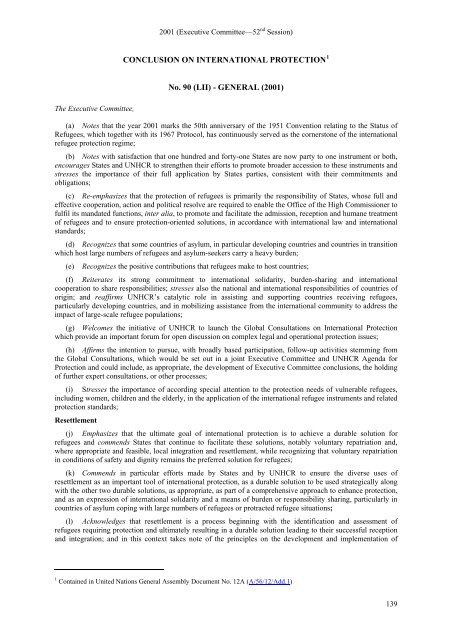CONCLUSIONS ADOPTED BY THE EXECUTIVE ... - UNHCR
CONCLUSIONS ADOPTED BY THE EXECUTIVE ... - UNHCR
CONCLUSIONS ADOPTED BY THE EXECUTIVE ... - UNHCR
Create successful ePaper yourself
Turn your PDF publications into a flip-book with our unique Google optimized e-Paper software.
The Executive Committee,<br />
2001 (Executive Committee—52 nd Session)<br />
CONCLUSION ON INTERNATIONAL PROTECTION 1<br />
No. 90 (LII) - GENERAL (2001)<br />
(a) Notes that the year 2001 marks the 50th anniversary of the 1951 Convention relating to the Status of<br />
Refugees, which together with its 1967 Protocol, has continuously served as the cornerstone of the international<br />
refugee protection regime;<br />
(b) Notes with satisfaction that one hundred and forty-one States are now party to one instrument or both,<br />
encourages States and <strong>UNHCR</strong> to strengthen their efforts to promote broader accession to these instruments and<br />
stresses the importance of their full application by States parties, consistent with their commitments and<br />
obligations;<br />
(c) Re-emphasizes that the protection of refugees is primarily the responsibility of States, whose full and<br />
effective cooperation, action and political resolve are required to enable the Office of the High Commissioner to<br />
fulfil its mandated functions, inter alia, to promote and facilitate the admission, reception and humane treatment<br />
of refugees and to ensure protection-oriented solutions, in accordance with international law and international<br />
standards;<br />
(d) Recognizes that some countries of asylum, in particular developing countries and countries in transition<br />
which host large numbers of refugees and asylum-seekers carry a heavy burden;<br />
(e) Recognizes the positive contributions that refugees make to host countries;<br />
(f) Reiterates its strong commitment to international solidarity, burden-sharing and international<br />
cooperation to share responsibilities; stresses also the national and international responsibilities of countries of<br />
origin; and reaffirms <strong>UNHCR</strong>’s catalytic role in assisting and supporting countries receiving refugees,<br />
particularly developing countries, and in mobilizing assistance from the international community to address the<br />
impact of large-scale refugee populations;<br />
(g) Welcomes the initiative of <strong>UNHCR</strong> to launch the Global Consultations on International Protection<br />
which provide an important forum for open discussion on complex legal and operational protection issues;<br />
(h) Affirms the intention to pursue, with broadly based participation, follow-up activities stemming from<br />
the Global Consultations, which would be set out in a joint Executive Committee and <strong>UNHCR</strong> Agenda for<br />
Protection and could include, as appropriate, the development of Executive Committee conclusions, the holding<br />
of further expert consultations, or other processes;<br />
(i) Stresses the importance of according special attention to the protection needs of vulnerable refugees,<br />
including women, children and the elderly, in the application of the international refugee instruments and related<br />
protection standards;<br />
Resettlement<br />
(j) Emphasizes that the ultimate goal of international protection is to achieve a durable solution for<br />
refugees and commends States that continue to facilitate these solutions, notably voluntary repatriation and,<br />
where appropriate and feasible, local integration and resettlement, while recognizing that voluntary repatriation<br />
in conditions of safety and dignity remains the preferred solution for refugees;<br />
(k) Commends in particular efforts made by States and by <strong>UNHCR</strong> to ensure the diverse uses of<br />
resettlement as an important tool of international protection, as a durable solution to be used strategically along<br />
with the other two durable solutions, as appropriate, as part of a comprehensive approach to enhance protection,<br />
and as an expression of international solidarity and a means of burden or responsibility sharing, particularly in<br />
countries of asylum coping with large numbers of refugees or protracted refugee situations;<br />
(l) Acknowledges that resettlement is a process beginning with the identification and assessment of<br />
refugees requiring protection and ultimately resulting in a durable solution leading to their successful reception<br />
and integration; and in this context takes note of the principles on the development and implementation of<br />
1 Contained in United Nations General Assembly Document No. 12A (A/56/12/Add.1)<br />
139
















